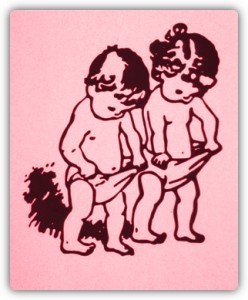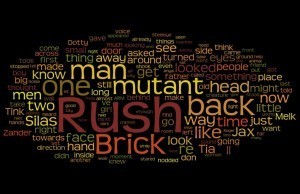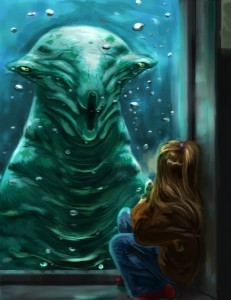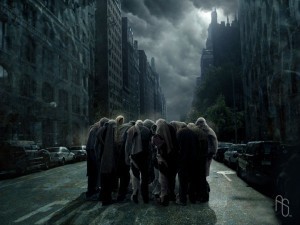Steve Feasey's Blog
April 10, 2014
Boys, girls and what they want to read

On Saturday, I gave a talk on ‘teenage boys and reading’ to the rather lovely people at the CILIP School Libraries Group Conference. My contention was that boys often want different things from their reading matter than girls, and if this is indeed the case that it’s part of my job as an author to try and understand what it is they want so I can create stories that will appeal to them.
I don’t write boys’ books and I don’t write girls’ books. I write books. But I do write books that I would have enjoyed reading when I was a teenager, and I happened to be a boy. That’s not to say girls won’t enjoy my stories – I have many female fans – or that boys don’t enjoy books written by women (or that feature a female protagonist), but to try and suggest that there is a one-size-fits-all way to publish and market books that will have universal appeal is ridiculous. If a book has a cover that shows a tank rolling across a field of human skulls, there is no reason why a girl shouldn’t pick it off the shelf and enjoy it, but I believe this girl would be in a minority. Is the fact that the book is jacketed in such a way wrong? Of course not. The jacket should reflect the story, and if the skull crushing military hardware does that, why not use it?
In the lead up to giving my talk I became very aware that there has been a good deal of discussion about gender reading, and that the subject generates some very strong feelings on both sides of the argument. Now I’m not for one moment suggesting that the availability of ‘The Bumper Book of Boy Adventure Stories’ or ‘The Girls’ Compendium of Fairy Stories’ is at all desirable, but at a time when it’s recognised that boys don’t read for pleasure as much as girls, surely we have to accept that any clever marketing that might address this unwillingness to engage with fiction can only be a good thing.
Last September, on the Book Riot website, this discussion engendered some forthright comments from both sides, so I thought my presentation might cause me some problems. I was pleasantly surprised to discover that the majority of the audience agreed with me. Despite the fact that I ‘lost’ three entire slides from my Powerpoint presentation, resulting in me getting a bit flustered and truncating my talk by about ten minutes, the librarians seemed to enjoy what I had to say. One school librarian came up to me afterwards and said: “Thank God somebody has the guts to point this stuff out. There is far too much pandering to the PC brigade, and trying to pretend that boys and girls are the same and want to read the same stuff. Good for you.” I wasn’t there to make a political point, but I got the distinct impression this was a subject that many of my audience had been kicking around for some time.
So what is it that boys want from books? Clearly, much of the stuff will be the same as what girls want. But too much YA fiction seems to focus on angst and inner turmoil (as if teenagers haven’t got enough of that to contend with already!) What’s wrong with action and adventure stories that don’t have a complex, heart-wringing love triangle at the centre of them? What’s wrong with the quest for power, and the realisation that power corrupts even the strongest among us? What’s wrong with having female protagonists who has clear and difficult goals, and who doesn’t need a boy or anyone else to help her achieve those goals? Any hey, what’s wrong with a tank rolling across a field of human skulls?
Nothing is wrong with them.
Gendered reading isn’t a bad thing in itself. To suggest all books will have an equal appeal to both sexes is naïve, and does nothing to address the different needs of some boys and some girls when it comes to reading matter. Get young people to read what they want, not what we want them to. If that’s action adventure stories with gun-wielding assassins, or if it’s a heart-rending tale of unfulfilled love, so be it. Being different isn’t bad. Trying to make everybody the same is.
April 1, 2014
Groovy little stop motion animation for Mutant City
February 17, 2014
Keep on keeping on. Why you just have to write your way out of the ****.
“Just write. If you do that, the other stuff will sort itself out.”
I remember hearing this (or some response very close to it) at an event when an author was asked for advice on how to take on the enormity that is ‘the novel’. It’s one of those answers that can come across as a trite or dismissive, but there is a truth to it that every professional writer recognises.
Writing can be hard work. When it is all going well, the words come easily and you find the story telling itself with, apparently, very little help from you. You’re a conduit through which your characters – if well-constructed and imagined – play out their roles in your fictional world. Your job is merely to transcribe their experiences and actions on to the page via the keyboard. That’s when it’s going well…
When it’s not going well, you sit with your head in your hands worrying about why the ideas won’t come and why you ever embarked on such a stupid project in the first place. You wait in stationary traffic, or queue in line at the supermarket, hoping – praying – for an epiphany. The more you stress, the more the story seems to be ‘getting away from you’.
When you’re in this bad place, writing can seem like a waste of time. Nothing you put down on the page is good enough. It’ll all end up being deleted anyway, so what’s the point? This is the tough part about writing; when the slings and arrows of outrageous fortune are all heading your way, and you can’t get your mojo working. I suspect it’s when the budding author decides this writing lark isn’t really for him or her, and when manuscripts are abandoned for the other great idea that popped into their heads the other night – that would be an easier book to write, right?

Authors know that when they’re in this dark place they have to write their way out of trouble. When the sky is black with those hurtling projectiles, the best place to take shelter is behind your computer screen (mine has its fair share of arrow holes in it), ducking down low, with your fingers still jabbing away at the keyboard.
My current project is the follow-up to my book, Mutant City, and I’ve been going through everything I’ve described above ‘when it’s not going well.’ I’ve written some terrible stuff over the last few weeks, and had, until yesterday, started to convince myself that this book was doomed. But I continued to write. Then, yesterday afternoon, I had ‘the moment.’ Something I’d written a fortnight ago – a little kernel of an idea hidden away in a line of dialogue – was what I’d been looking for: the thing I’d been searching for that would make the book come together. I recognised this moment thanks to the trumpet-playing angels swooping about my head, and the shower of silver confetti that miraculously fell from the heavens.
“Just write. If you do that, the other stuff will sort itself out.”
January 28, 2014
Thank You Readers
It’s getting closer to the publication of my new book, Mutant City. The wonderful people at Bloomsbury Publishing are very excited about it, and the publicity machine is starting to rumble into action. Bound proofs have been sent out and I’m eagerly (nervously) awaiting early reviews.
This is the worst time for a writer.
Why?
It’s at this time you start doubting yourself and your writing like no other. You’ve read and edited the book so often that you begin to dislike it (you might even convince yourself it is rubbish). Angst piles up on angst, and you can’t help but ask yourself what you were thinking, coming out with a book like this. What if nobody likes it? Will the reviews be favourable? Why didn’t I write that OTHER book? You even doubt the voices of sanity around you: your editor, your agent, even your beloved partner are all part of some conspiracy to hoodwink you into thinking that the book is fine – better than fine, it’s good.
At times like this, the best thing to do is remember your fans. A quick look through comments and feedback on previous works – works you also felt weren’t ‘right’ – are enough to make you realise that you CAN tell a good story, and your writing DOES inspire people.
So this blog post is a thank you to all my readers.
Thank you for keeping me sane(ish), and for buoying me up when I need it most. Thanks for reminding me that people DO still read out there, and that stories are important to us.
S
January 8, 2014
Mutant City Word Cloud
October 15, 2013
Triggers
It occurred to me that I haven’t shared my thoughts about triggers. That’s right, triggers, not Tiggers.

Triggers are things that you turn to when you get stuck (at least, I do). They take different forms for different people – a piece of music, a song, an image, a poem. And they’re not always obvious. Sometimes they’re a phrase or a colour, sometimes they are truly enigmatic. But whatever yours is, once you’ve put your finger on it, guard it and cherish it because no matter how good you are, you’re gonna get stuck.
For a recent book I’ve been working on, it’s a song. A haunting little melody that somehow became the catalyst of an idea for a book. Every time that piece of music came into my head, the book began nagging at me, and I would be forced to write something. The fact that I was supposed to be writing something else at the time was not important to my brain; these things have a habit of forcing their way inside your head and refusing to budge.
For my new series (out in April next year, folks) I deliberately constructed some triggers to help me when I needed inspiration. I’m still not allowed to talk about the book, but I figure I CAN reveal the visual and audio prompts I’ve been turning to to kickstart my brain at times.
For musical inspiration I would play this little beauty (Hans Zimmer really is a great, isn’t he?):
http://www.youtube.com/watch?v=LqRZ2_w56U0
Inspiration in written form came from Mr Eliot:
I will show you something different from either
Your shadow at morning striding behind you
Or your shadow at evening rising to meet you;
I will show you fear in a handful of dust.
And if all that didn’t get my creative mojo jumping , I’d have a quick flick through my ‘flash’ for some added inspiration. Here are a few of the images from my magical triggorium:

May 21, 2013
Sorry
I’m grumpy. I have no reason to be, but I still am.

Well, when I say I have no reason, I mean I have no good reason. I’m just grumpy because I have a head full of book that is proving to be bothersome.
Writers are buggers to live with when they’re cooking up a story. We are self-centred and often distant with those with whom we share our space. We’ll half-listen to conversations and get irritated when the minutiae of life gets in the way of the thing we really want to do: make stuff up.
I’m hell to live with like this, and I don’t know how those around me put up with it. So by way of apology, I’ve penned a little poem for them.
An Apology Poem
The words you speak are superimposed on those of another: a lover, a mother, a champion, a villain, a brother.
And even though I try not to be consumed, not to wallow in gloom, not to pace the room. I can’t always pull it off.
This tale inside my head, by which I am led like a lamb to the slaughter, invades my conscious and subconscious life, a nagging fishwife.
You smile and nod. “It’ll be fine. Have some wine.” You build me back up and tell me what I need to hear.
And when I read the words back to myself, I know they are as much a part of you as they are me.
My stories are your stories. We just tell them in different ways.
May 8, 2013
You show me yours and I’ll show you mine.
A writer acquaintance of mine approached me today and asked if I would be interested in meeting up with her and another friend to appraise and critique each other’s work. She suggested that writing is such a lonely profession that it helps to get together and share where you are in your writing with others.
This makes sense, and I know a number of people who do similar things to this.
It would be utterly anathema to me.
The thought of showing anyone my work before it’s gone through at least one round of bloody good edits fills me with horror. I can’t even stand sending the ‘finished’ thing off to my agent or editor, and have to force my finger to hit the button that pings the attached file over. And it’s not just the fear that they’ll come back to me and tell me it isn’t any good (not happened to me yet, but I’m still working on it, folks), it’s something deeper than that; it’s something about letting go that I find really hard.
When I came home from meeting this person, I tried to put my finger on what it is that makes this so difficult for me. And I came to the conclusion that I don’t like letting people in to my world very much.
Writing is about exploring self, so this is exactly what happens every time you show somebody your work: you let them in to places only you have been before. I liken finding a story to going back to a house you grew up in and climbing up into the attic to explore. Somewhere up there is an old junk box full of stuff that’s been hidden away for a very long time; stuff that means so much to you, but not necessarily to anyone else. Your job is to find what it is about that thing that’s so meaningful, and express it to others in the same way. Finding an old photograph of you crying on a swing in the park will not necessarily evoke strong memories or emotions in someone, but if you go on to tell them how it was the park where your older brother bumped into you and knocked your ice cream down into the mud and ants, and how he laughed at you when you told him he was rotten and wished he was not in your life. If you tell them how he disappeared a little while later, getting into a van with a strange man, leaving you alone in the park until an old lady came out of her house to find you on that swing, still crying. If you tell them about the bogey man in the yellow transit who leered out of the window at you as he drove away, and how your brother, his terrified face pressed up against the glass, appeared to be calling out your name. If you tell them…
You get the idea.
I haven’t got an older brother. But just writing those few lines made me squirm in my seat, and I could feel my face twisting into the mask of both the kidnapper and the abducted child as I tapped away at the keyboard. You go to those places when you write. You take yourself there and live those moments through the eyes of the people there. You tell their story, and it becomes a part of you.
And then you have to show others. And that is hard.
May 1, 2013
Oh, and by the way, did I tell you about my chlamydia?

I don’t do a lot of Facebook. I dip in and out occasionally, but I find it eats up time more greedily than even tequila, so I ration myself accordingly. I like the swiftness of Twitter more, although that too can be bit time-hungry. Anyway, having dipped my toe into the Facebook waters again recently, I was surprised by how some people share such deeply emotional and personal issues on there with so many people. (Now, if your Facebook feeds are only ever going to be viewed by close friends and family, and you don’t have any ‘acquaintances’ or only-online mates on there, this might be okay. But how many of us have that? Hmmm?) And it’s not just the revelations. It’s also how these same people then baulk at some of the responses they get; commenting back that they were not expecting people to be so mean/angry/nasty/spiteful/unsympathetic.
Why?
Did they think that because they’ve chosen to wash their laundry in public that the responders were not then allowed to comment on the colour and condition of their Agent Provocateur g-string? Did they believe that airing their angst should only merit sympathetic responses from their followers because if they follow X, surely they must love everything about X and only say nice things about them?
Come on, people. Really? If I walked into a room full of people, half of whom I only knew tangentially, and started to spout on about my physical, mental and emotional problems, I know for a fact that at least a few of them would want to slap me about the face and tell me to get a bloody grip. Yes, some of them would be genuinely sorry for me. Some would try and give me useful advice and moral support. Empathy would be shown by some, sympathy by others. But some, some would want to tell me to shut the hell up. Because, guess what? We’ve all got problems. It’s how we choose to deal with them, and whom we choose to talk about them with that matters. By all means ask for help and/or advice, but maybe opt not to do so online in a public forum if you don’t want some of that advice to be contrary to your expectations and wishes.
If I walked into a room full of people, half of whom I only knew tangentially, and started to spout on about my physical, mental and emotional problems, I know for a fact that at least a few of them would want to slap me about the face and tell me to get a bloody grip. Yes, some of them would be genuinely sorry for me. Some would try and give me useful advice and moral support. Empathy would be shown by some, sympathy by others. But some, some would want to tell me to shut the hell up. Because, guess what? We’ve all got problems. It’s how we choose to deal with them, and whom we choose to talk about them with that matters. By all means ask for help and/or advice, but maybe opt not to do so online in a public forum if you don’t want some of that advice to be contrary to your expectations and wishes.
This is something that the internet generation struggle to cope with. My own daughter often posts stuff that I think she would be better keeping to herself, and when I tell her she’s opening herself up to some responses she will not like, she shrugs, only to tell me later on that so-and-so upset her by making snide comments about those very same posts. At a time when we all feel the need to tell everyone and anyone who gives a shit what we are having for lunch, it’s important to remember that not everything that comes out of the washing machine needs hanging out on the line for the whole world to look at.
April 19, 2013
Now is not the time!
 Stories have a funny habit of creeping up and ambushing you when you’re least expecting them. At times their insistence on being heard is almost pernicious in nature, and it seems as though some of the best ones wait until you’re smack-bang-in-the-middle of your current work in progress before they reveal themselves, jumping up and down and waving their arms and saying, ‘Look at me, I’m much more interesting than that old thing you’re working on!’
Stories have a funny habit of creeping up and ambushing you when you’re least expecting them. At times their insistence on being heard is almost pernicious in nature, and it seems as though some of the best ones wait until you’re smack-bang-in-the-middle of your current work in progress before they reveal themselves, jumping up and down and waving their arms and saying, ‘Look at me, I’m much more interesting than that old thing you’re working on!’
I’ve blogged about this before, but when it happens it leaves a writer in a bit of a quandary. Because stories need to ferment inside your head if they’re ever going to become anything substantial. You need to give them time and attention. They’re not like one of those robot vacuum cleaners that you turn on and let trundle around your room, doing their own thing until you come back later to check what has turned up in the dust compartment. They take up brain space, and they take up the part of your brain used for ‘making stuff up’. And if you’re in the middle of another story, that can get in the way.
I twittered something about this the other day, and a friend of mine agreed, saying that there should be a holding pen for these stories, where they can be corralled and left for a while.
 I’ve had two big ‘Pick Me, Pick Me!’ ideas in the last few months, and the first one couldn’t have come at a more inconvenient time. The one I think is a sure-fire winner came out of the blue when I was in the most difficult stage in the writing process – trying to fix a broken narrative. I was already struggling to get my latest manuscript back on track, after I’d lost control of at least two story strands, when this new, super-duper, worldwide-bestseller, sure-to be-a-hit story idea came to me like a bolt of lightning. Now I know that it’s a good thing to have these ideas (it’s when they dry up you’re in BIG trouble), but come on… timing people, timing!
I’ve had two big ‘Pick Me, Pick Me!’ ideas in the last few months, and the first one couldn’t have come at a more inconvenient time. The one I think is a sure-fire winner came out of the blue when I was in the most difficult stage in the writing process – trying to fix a broken narrative. I was already struggling to get my latest manuscript back on track, after I’d lost control of at least two story strands, when this new, super-duper, worldwide-bestseller, sure-to be-a-hit story idea came to me like a bolt of lightning. Now I know that it’s a good thing to have these ideas (it’s when they dry up you’re in BIG trouble), but come on… timing people, timing!
What I wanted to do was stop everything I was doing with my WIP, and start work on this Ay Carumba! interloper. I knew how the new story would start and how exciting the opening chapter would be. I knew how my protagonist would be both sensitive and fearless in the face of the enormous conflicts he would face, and I knew how I could weave in that all important love interest in such a way that it would seem natural and heartfelt.
What I did was shelve it.
I have pushed into a quiet corner of the ‘making stuff up’ part of my brain, and told it to sit there and not disturb the rest of the class.
It’s sulking, but, thank goodness, it has not picked up its coat and walked out. I keep catching sight of it while I’m writing on the blackboard, and I know it waits for these moments. It shuffles its feet and coughs loudly, but I refuse to give in.
For me, this is one of the main differences between being a writer and being a professional writer. A writer would jump on the shiny new idea. He or she would scrap the work in progress, telling themselves that they’ll come back to it, and start on the sure-fire hit. The WIP would end up in a box under the bed, or a forgotten folder somewhere on the hard drive. As a professional writer, you can’t allow that to happen. You have to push ahead with the story you are working on, the one you have pitched to your agent or your publisher and have been commissioned to write. Even if it’s not as bright and shiny and exciting as the next-big-thing story that has come knocking at your door, you have to write it and write it to the best of your ability. Because that’s your job.










